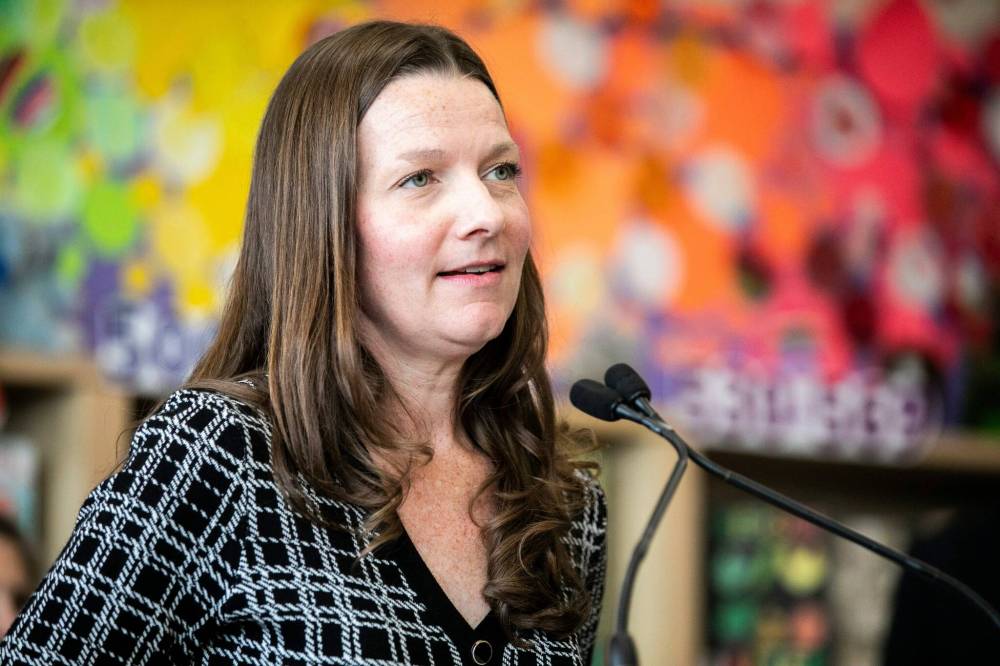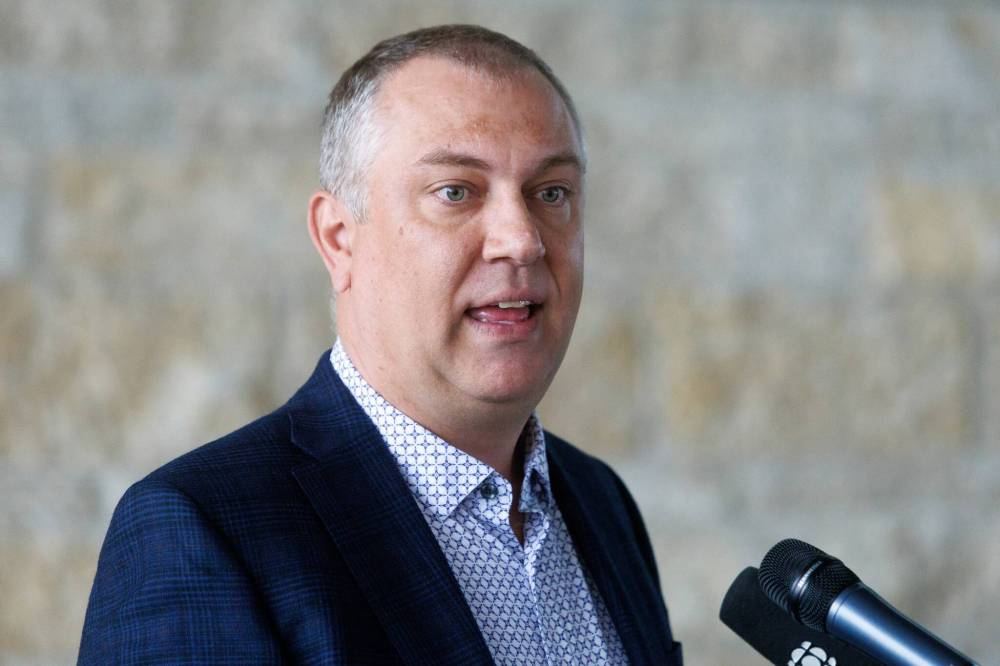High school students to get better grounding in financial literacy
Advertisement
Read this article for free:
or
Already have an account? Log in here »
To continue reading, please subscribe:
Monthly Digital Subscription
$0 for the first 4 weeks*
- Enjoy unlimited reading on winnipegfreepress.com
- Read the E-Edition, our digital replica newspaper
- Access News Break, our award-winning app
- Play interactive puzzles
*No charge for 4 weeks then price increases to the regular rate of $19.95 plus GST every four weeks. Offer available to new and qualified returning subscribers only. Cancel any time.
Monthly Digital Subscription
$4.99/week*
- Enjoy unlimited reading on winnipegfreepress.com
- Read the E-Edition, our digital replica newspaper
- Access News Break, our award-winning app
- Play interactive puzzles
*Billed as $19.95 plus GST every four weeks. Cancel any time.
To continue reading, please subscribe:
Add Free Press access to your Brandon Sun subscription for only an additional
$1 for the first 4 weeks*
*Your next subscription payment will increase by $1.00 and you will be charged $16.99 plus GST for four weeks. After four weeks, your payment will increase to $23.99 plus GST every four weeks.
Read unlimited articles for free today:
or
Already have an account? Log in here »
Hey there, time traveller!
This article was published 25/11/2024 (406 days ago), so information in it may no longer be current.
Math teachers are applauding the province’s pledge to mandate lessons on money management for all incoming high schoolers.
The NDP government announced vague plans to introduce “a dedicated unit on financial literacy in Grade 9” in its throne speech last week.
“Financial literacy, I think, has been on the back burner for a long time,” said Miles MacFarlane, a high school math teacher in Winnipeg.

Acting Education Minister Tracy Schmidt. (Mikaela MacKenzie / Free Press files)
“It’s been simmering away and it’s certainly important; if there’s any math you’re going to do in life, it’s likely going to have to do with money.”
For MacFarlane, being financially literate means having the knowledge and confidence to enter a bank, get a loan and figure out a budget.
The more students know about interest rates, payment periods and related concepts, the more nuanced their financial decision-making will be, the veteran teacher said.
Grade 12 student Adam Donaghy echoed those comments. The 16-year-old said he wished he had received formal lessons on mortgages and car and home insurance, among other things.
“A lot of us are learning how to drive. I got my own car recently and I sat there with my mom and I had no idea what they were talking about. Learning about that kind of stuff (would be helpful),” he said.
Tracy Schmidt, acting minister of education and the mother of a teenage girl who just entered high school, said the intention is to set up children for financial success in Grade 9.
“This is the year that many Manitoba kids are getting their first jobs, opening their first bank accounts,” she said, adding she’s been observing her daughter and her friends’ spending choices with interest on group outings to the mall.
It is also the final year during which all students take the same compulsory course in the subject, with topics ranging from circle geometry to statistics and probability.
In Grade 10, students have the option to take “essential mathematics” or an introductory course to applied and pre-calculus math. They typically choose one stream and stick with it.
The essential path covers currency exchange, personal banking and government taxation forms, among other subjects that prepare registrants for real-world budgeting.
All students should be exposed to content in these optional essentials courses, said Will Penner, who teaches Grade 8 math in Winnipeg.
“I do love the fact that financial literacy is being implemented,” Penner said, adding he suspects the rollout will introduce existing essential lessons earlier.
As far as he is concerned, all graduates would benefit from studying the various ways income is earned and payments are made, such as hourly wage, salary and contracts, as well as the Canadian Pension Plan, employment insurance and income tax deductions.
“Grade 11 has great stuff on managing money and a unit on interest and credit,” he added.
Compound interest, loans and credit cards are part of that module in the optional course.

Nathan Martindale, president of the Manitoba Teachers’ Society (Mike Deal / Free Press files)
Nathan Martindale, president of the Manitoba Teachers’ Society, called the plan to expand financial literacy “a good idea.”
Under the former PC government, Manitoba Education partnered with Enriched Academy — a Canadian company with the motto, “we make financial freedom accessible to everyone” — ahead of the 2023-24 school year.
A total of $100,000 was earmarked for the pilot anticipated to equip 1,500 students with money management skills.
“While we’re glad to see the government make this PC initiative permanent for Grade 9, it should be expanded to all senior grades to ensure students are building on these skills throughout high school,” Grant Jackson, education critic for the Tories, said in a statement.
The NDP has yet to release a timeline to implement the new math unit, which Schmidt said will fill a curriculum gap identified by students, parents and the government.
From time to time, a teenager will ask MacFarlane how mastering a specific numeracy skill will benefit them outside of his math classroom.
His typical response is to urge them not to fret too much about real-world applications and enjoy the challenge of solving “puzzles,” the high school teacher’s preferred way to describe math problems.
“It wouldn’t exist if there wasn’t some application for it, whether you personally will use it or not is beside the point. If it’s not the math that we’re learning (itself), it’s self-regulation, it’s commitment to a project, it’s time management, it’s organization,” said MacFarlane, a teacher of more than 30 years.
New financial literacy lessons will provide a tangible context in which to explore many of the basic math concepts that are already taught, he said.
MacFarlane said he hopes there will be clear outcome statements to accompany them before the rollout.
maggie.macintosh@freepress.mb.ca

Maggie Macintosh
Education reporter
Maggie Macintosh reports on education for the Free Press. Originally from Hamilton, Ont., she first reported for the Free Press in 2017. Read more about Maggie.
Funding for the Free Press education reporter comes from the Government of Canada through the Local Journalism Initiative.
Every piece of reporting Maggie produces is reviewed by an editing team before it is posted online or published in print — part of the Free Press‘s tradition, since 1872, of producing reliable independent journalism. Read more about Free Press’s history and mandate, and learn how our newsroom operates.
Our newsroom depends on a growing audience of readers to power our journalism. If you are not a paid reader, please consider becoming a subscriber.
Our newsroom depends on its audience of readers to power our journalism. Thank you for your support.



